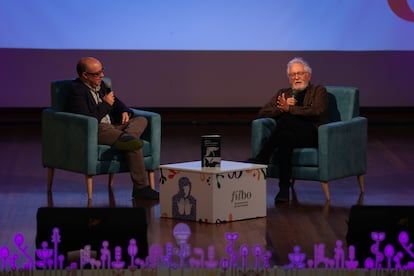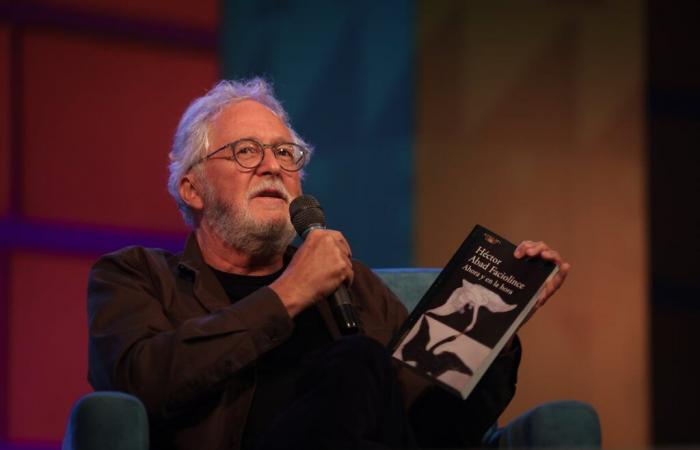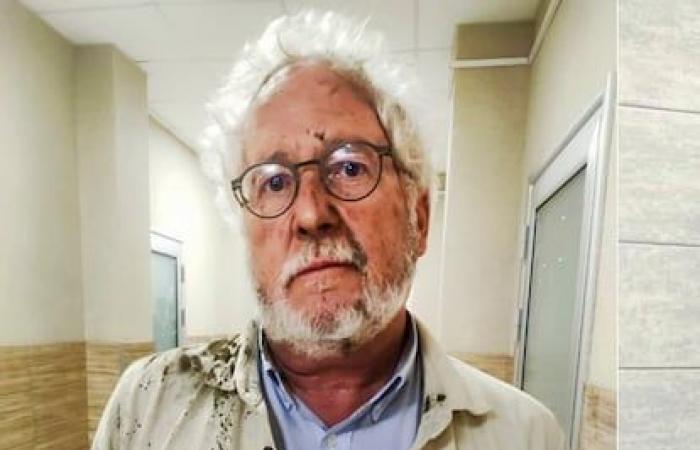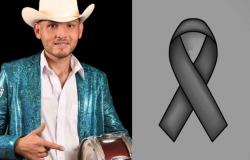Héctor Abad Faciolince’s new book, Now and in the hour (Alfaguara), she is inspired by Victoria Amelina, the Ukraine writer who looked like a swan, with which she had just changed positions when a Russian missile with six hundred kilos of explosives reduced to debris the pizzeria in which they departed in Kramorsk (Donetsk region), near the battle front. The explosion seriously injured 62 people and killed 13, including Amelina, while Colombian visitors who accompanied her only suffered minor injuries and bruises. “An old man, who was half a fed up with life, feels guilty to survive in those circumstances,” Abad Faciolince (Medellín, 66 years) granted this Saturday in one of the most anticipated presentations of the International Book Fair of Bogotá, La Filbo.
“The defense of Ukraine, for me, has been a fair cause for several years,” says La Carta, signed in Bogotá by the Antioquia writer, who received all those attending a full auditorium. In the defense of that cause, he explains, he made a trip to kyiv in mid -2023 The forgetfulness we will beone of the most moving works in Latin American literature, the novel in which he recounts the life and death of his father, and a campaign of solidarity, Boda, Ukraine!, conceived by the ex -commissioner of peace Sergio Jaramillo. The reporter Catalina Gómez completed the group. “There I let myself drag to go further, near the war front, in the East of the country. They almost kill me,” the letter continues. “This book is the story of my solidarity with Ukraine and my obsession with what should have been the place and time of my death.”
His words were loaded with an inocal emotionality. “Victoria in some way, since she could not speak, she helped me to tell; just as my dad helped me tell her book,” said Abad Faciolince, dressed in black in tribute to her deceased colleague, who was mourning from the Russian invasion of 2022, during the talk in the José Asunción Silva de Corferias auditorium. “Victoria is an obvious victim of the struggle for freedom of expression, for freedoms in general, and for democracy,” he said. “That’s why I felt for the first time, since The forgetfulness we will bethe responsibility and obligation to write a book … I did it because I had to give voice to a person who lost his voice, who lost his mind and lost his life in front of me. ”
The story concludes, and begins, at a book fair. In mid -2023, barely recovered from open -heart surgery, Abad Faciolince accepted the invitation of its young Ukrainian editors to go to the Arsenal Book Fair, in kyiv, to present the translation of The forgetfulness we will be and accompany the launch of the solidarity campaign. It should be just a three -day trip, but at the farewell dinner Sergio Jaramillo and Catalina Gómez decided that their incursion could not be reduced to the capital, which had to go to the east, towards the Donetsk and the Donbás, to be able to testify, accompanied by Amelina, who had stopped writing fiction to document war crimes. “I didn’t want to go, I don’t have a hero pasta, but shortly after I would understand that it is almost impossible not to be convinced by an expert in negotiation,” he says in Now and at the time. It is also a book about those friends whom it portrays: Jaramillo, the architect of the peace agreement with the extinct guerrillas of the Farc, and Gómez, a tanned war correspondent in the Middle East and now in Ukraine.
The group observed in its path the ruins of the conflict: burned tanks next to the road, bells fallen from a shattered church, schools and hospitals or abandoned peoples. “It had been a journey full of pain and deep emotions (because of the traces of Russian terror we had seen), because of the sadness of those who had lost their parents or their children, but deep down it had also been a quiet trip. Death was close, yes, but we had not felt that we were breathing in the neck. Whether it was for unconsciousness or recklessness, at no time in that pair of days we had felt true. Antioqueño. Until death fell from the sky for Amelina, who was the same age of Daniela, the daughter of Héctor Abad Faciolince, who in turn then had the same years of his father – a doctor and university professor – when he was shot dead.
“I felt as if hell were sprouting from the bottom of the earth,” he writes in the book about the moment of the outbreak. “I cannot assure if I threw myself or fell to the ground; everything seemed to get rid of for a moment, life and fear, time, the sounds, the place where I was. I know that almost immediately I got up stunned, without even understanding if I was alive or not (my last thought, when falling, it had been” killed us “), he tells. “A time later I could be sure that I practically did not have a scratch, that I had risen unable, unharmed and alive, amazingly alive, although I will never be the same again.” Victoria Amelina died days later in a hospital in Dnipro because of the wounds.

“I thought I thought about the most courageous and most loving book that I have read in a long time,” the Bogota writer Ricardo Silva Romero, his interviewer this Saturday, said in reference to a testimony that distills love for the family, friends or writing, but also for the cause of Ukraine. “It is full of courage, because you have to have value to write it,” he said to claim his colleague, who insistently portrays Now and in the hour as a coward who never wanted to make that trip from which he let himself be reluctant. “As one taught in the script classes, the heroes are always reluctant,” he said in his presentation.
It is a book that emerged from love, but also from guilt, Abad Faciolince reflected, also obsessed with the death of two 14 -year -old sisters, Juliya and Anna Aksenchenko. “Although I am not to blame for this missile to kill these twins, nor had an eight -month -old baby hurt in the head, nor that he had killed so many people, an old man, who was half fed up with life, feels guilty to survive in those circumstances,” he said. “Putin is blame, they have their generals, people who throw bombs on civil objectives.”








